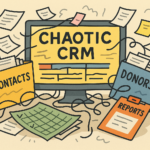Introducing KPIs to a Team That’s Never Had Performance Goals

Introducing KPIs to a team that has never worked with formal performance goals is not a change-management exercise—it’s a reset of expectations. Done poorly, KPIs feel punitive. Done properly, they become a source of clarity, discipline, and pride in work well done. The difference lies in how they are introduced and what they are used for.
Start With Purpose, Not Numbers
Before a single metric is discussed, the team needs to understand why KPIs are being introduced. This is not about surveillance or catching people out. It’s about professionalism. Every serious organisation—commercial or nonprofit—measures whether effort is translating into outcomes. KPIs exist to answer one basic question: Are we making progress on what actually matters?
Be direct. A team without goals drifts. Drift costs money, morale, and credibility. KPIs are how you replace ambiguity with focus.
Acknowledge the Past—Briefly—and Move On
If the team has operated without performance goals, name it without apology or blame. “We haven’t been clear about success in the past. That changes now.” Then move forward. Long explanations about historical shortcomings weaken authority. Teams respect leaders who draw a line and set a new standard.
Define What “Good” Looks Like
Many teams resist KPIs because they’ve never been told what success actually means. Vague expectations like “do your best” or “be strategic” are useless. KPIs force specificity: response times, output volume, quality thresholds, revenue targets, cycle times, or engagement levels.
Start small. Three to five KPIs per role is enough. Anything more is noise. If everything is a priority, nothing is.
Involve the Team—But Don’t Abdicate Leadership
Consultation matters, but this is not a democratic vote. Invite input on what should be measured and what data already exists. Teams often know where the real pressure points are. However, leadership must make the final call. Performance goals lose credibility if they are negotiated into meaninglessness.
Separate KPIs From Punishment
Early resistance often comes from fear. Be clear: KPIs are a management tool, not a disciplinary weapon. Initially, use them to establish baselines and patterns, not to hand out consequences. Once the system is embedded and understood, accountability naturally follows.
Build Reporting Discipline Early
A KPI that isn’t reviewed is theatre. Set a regular rhythm—monthly is usually right. Review results consistently, calmly, and without drama. Praise improvement. Address underperformance factually. Over time, the team learns that performance discussions are normal, not personal.
Lead by Example
If leaders refuse to be measured, the system collapses. Share leadership KPIs openly. When teams see that expectations apply upward as well as downward, KPIs gain legitimacy fast.
Expect Discomfort—and Don’t Retreat
Introducing KPIs will unsettle people who have been comfortable operating without scrutiny. That discomfort is not a signal to retreat; it’s evidence the change matters. Stay steady. Consistency is what turns KPIs from a “new initiative” into the way things are done.
The Payoff
Teams without goals rely on effort. Teams with goals deliver outcomes. Over time, KPIs reduce politics, clarify priorities, and make performance conversations easier—not harder. Most importantly, they give good staff something they’ve often lacked: a clear definition of success and proof that their work matters.
Introduce performance metrics properly, and you don’t just measure performance—you raise it.









